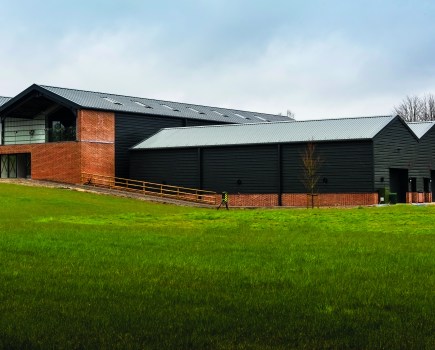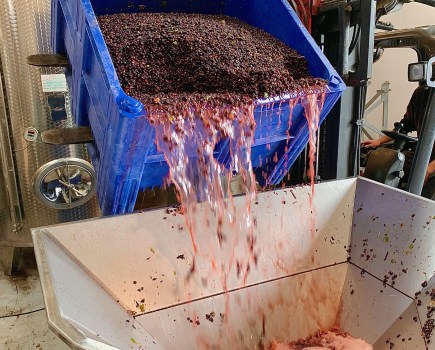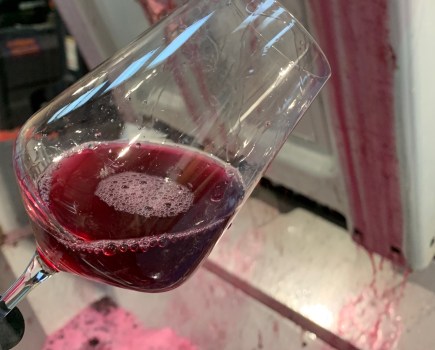Vine plantings are booming, yields are promising, optimism in the sector is encouraging and vintage 2022 is upon us. The UK now has well-established contract winemaking services as the infrastructure expands, which can be an attractive alternative to establishing a winery. Jo Cowderoy speaks to Defined Wine and Litmus Wines – two of the UK’s leading contract wineries about their services – as well as finding out the top tips to aid a smooth contract relationship for both parties.
Contract wineries are not just for the smaller growers, where economies of scale may not warrant the substantial investment a winery requires, but for medium and larger producers who may need flexibility within their capacity. Some producers may have issues with obtaining planning permission to build a winery facility next to their vineyard, so need contract services. Others may foresee challenges with finding skilled, high-calibre staff.
Whatever the reason, when it comes to choosing a contract winemaker, good communication, a shared vision and trust are vital starting points. There are three main categories of contract providers in the UK; those that are set up as dedicated, contract-only wineries; those that produce their own brand but also run a contract winemaking business, and those that take on a few small contract customers, alongside their own brand. In fact, a fourth category is emerging in the UK – a partnership arrangement.
“The provision of contract winemaking is becoming an increasingly important element of production here,” explained WineGB CEO Simon Thorpe MW. “ As more vineyards are being planted there’s a choice to be made about how to process the grapes, and there is certainly an increase in winemaking capacity, both at the contract winemakers, hybrids and those concentrating on their own production. Fortunately, at this stage I’m not hearing of specific challenges around shortage of winemaking capacity for this vintage – but of course this is a moving feast in the run up to harvest!” Simon added.
“Planning is always a challenge,” Simon continued, “but specifically with regards to contract wineries, there is perhaps less requirement to be positioned directly next to vineyards on agricultural land. As an industry we must continually work to educate planning authorities. WineGB is committed to supporting its members with their planning applications and we frequently provide letters of support which invariably help towards successful outcomes,” Simon added.
Why use contract services?
Deciding to use contract services or investing in a winery is a decision for the individual producer. A winemaker with extensive previous contract experience, David Cowderoy, Managing Director of BevTech Ltd, commented: “It is easy to just look at the straight financial comparison between own production and contract winemaking. But there are less obvious considerations which can be just as critical – the most important of which is skill set and experience. Even a medium size winery will probably not be able to afford a winemaker with the same experience as a large contract winery. Consultants are an option, but they are not generally on site throughout harvest,” David added.
“Obtaining winery staff with good practical engineering and mechanical skills is also essential,” he continued. “In my view winemaking is often one third science, one third art and one third practicality – if your press breaks down in the early hours of the morning, it doesn’t matter how good you are at the other two thirds, the grapes can very quickly spoil if you can’t get the press working,” David exclaimed.
“I have seen a lot of new wineries trying to setup to do every operation, right from the first harvest,” said David. “This means that there is a huge amount to achieve, even for an experienced winemaker, and a lot to go wrong. It is much better to look at rationalising operations and contract out some of the tasks, such as the back end – bottling or disgorging, or even the front end – grape processing to bottling,” he added.
“New entrants to the sector like to get very involved with every step of production during the first couple of years – but they soon realise that standing on a bottling line all day is very dull. Especially if all they can justify is a slow speed line. In fact, it’s often better to use their time to do the jobs which can’t easily be contracted out – like selling,” said David.
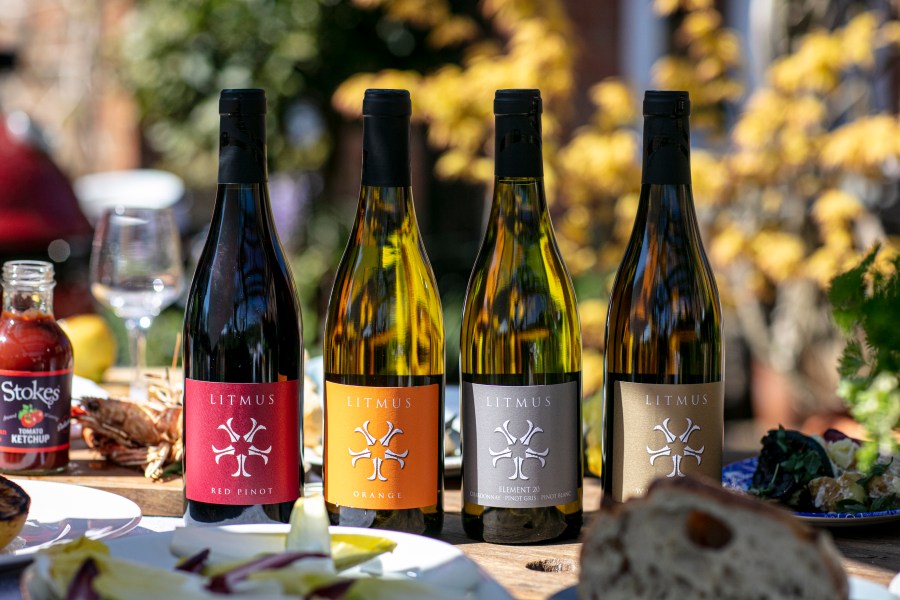
A distinguished long service
Established over 14 years ago, in 2008, Litmus Wines is based at Denbies Wine Estate, Surrey and is run by John Worontschak and Matt Elzinga. “We run our contract winemaking business and supply IOC (Institut Oenologique de Champagne) goods and services, utilising the excellent infrastructure of Denbies in terms of staff and equipment,” explained John. “In partnership with Denbies we make a small range of still premium Litmus Wines,” he added.
As the industry grows, so does Litmus Wines to respond to demand. “We are currently processing around 600 tonnes of fruit for contract customers, but we are planning to increase our capacity to 1000 tonnes,” commented John.
The benefits
“There are so many benefits to using Litmus Wines contract services, explained John, “Cost firstly. The costs of running and staffing a production facility only makes sense after a certain size. Employing the level of competence and experience needed amortised per bottle only starts making sense after a certain number of bottles are produced. You can argue about what this size is but personally I think it’s about 100,000 bottles before it makes sense, if you need to do it to make an income,” commented John.
“Without this economy of scale there is just too much to do. The backroom operations and the myriad of regulations and form filling, vineyard, winemaking, and sales mean that if you are understaffed the main point of it all – which is to make quality wine – is compromised and shortcuts are taken,” he added.
“People seeking contract winemaking often find it difficult to know what the final costs will be and have varying requirements, and so we have developed a very useful cost calculator on the website which breakdown the various costs that depend on what style you choose and what services you require which greatly helps with financial planning,” said John.
Getting the balance right
Litmus Wines focus on contract winemaking but do also make some own brand wines. “It’s always a balancing act for tank space and keeping things separate and all well looked after. Fortunately, at Denbies we have many tanks of varying capacities – and logistics are a large part of being a good winemaker,” said John.
Wine styles
“We have the experience in years, vintages and the sheer number of countries worked in, with huge exposure to all aspects of the wine business to understand all wine styles and their production – from Champagne to Rutherglen Muscat and everything in between,” commented John.
Producing many different styles of wines, and the vast winemaking experience, means the Litmus Wines philosophy is flexible. “We have our own philosophy in the Litmus Wines range, which is complex, food wines, with extended ageing in barrel and bottle before release. With another philosophy for producing own label supermarket wines, and finally we listen to our contract clients carefully for what they are looking for and their philosophy – from straight stainless-steel fermentations to organic and biodynamic production in oak or concrete egg,” John added.
“There is no right way to make all wine, after excluding all faults, that are not complexing or nuanced and hence beneficial to the wine. Knowing the limits of these complexing factors takes experience,” explained John.
“The overarching philosophy I suppose is similar to the medical profession where no harm must come to the patient, so careful monitoring and implementation of the basic axioms of good winemaking are followed intently, and whilst a terrible cliché which pains me to say, we only intervene when necessary. Good quality ripe fruit needs little coaxing once the direction and style has been determined,” said John.
In order for the client and contract winery relationship to work, John says the key points are: “Communication, honesty, integrity, ability, reliability and a touch of humility.”
A growing industry
“My personal journey began when as a young Australian winemaker I arrived on these shores in 1988. I began making wines in England and set up a very early contract winemaking service at Stanlake park. Looking back, I knew so little that departed from straight forward, boring, standardised winemaking but thought I knew everything. How much I have forgotten since then!
“It’s been a pleasure to watch this industry grow and with the improved climate and massive increase in knowledge and expertise, I have seen the progression from what were truly awful wines – to world beating ones! In 2010 I decided that still wines were massively underrated and began the Litmus Wines range and it’s wonderful to see so many great still wines being made today.
“The situation has changed from other winemakers asking why the hell would I want to make wine in England to a recent comment from a young Australian winemaker working here who said to me, “I’m staying here because the winemaking opportunities are so much greater here than at home. Never saw that coming!” John concluded.
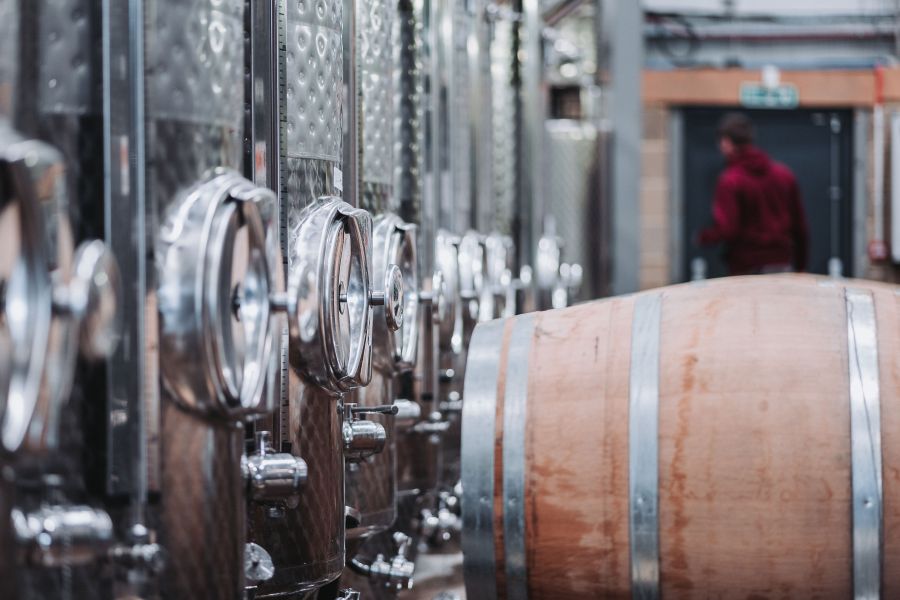
A unique ‘contract-only’ winery
Defined Wine is a dedicated ‘contract-only’ winery, without its own wine brand, so the winery is able to focus entirely on contract customers. The winery is run by an expert team with global experience and led by international winemaker, Nick Lane, along with Poppy Seeley. The state-of-art winery was set up in 2018 by Henry Sugden and designed to operate efficiently for their many contract customers, to offer a wide range of wine styles, as well as provide temperature-controlled bonded storage. The winery has state-of-the-art technology to match for monitoring and record keeping and a fully equipped laboratory, to support the winemaking.
Fully equipped lab
Defined Wine was one of the first wineries to be accredited to the WineGB sustainability scheme, Sustainable Wines of Great Britain (SWGB) which means that clients with fruit from accredited vineyards can use the SWGB logo on their labels and marketing. Defined Wine is based in Kent, near Bridge, with easy access just off the A2 south of Canterbury.
“We are set up to exclusively offer contract winemaking services,” explained Henry Sugden, Defined Wine CEO. “Nick Lane, our Head Winemaker, was at Cloudy Bay for 13 years and then spent five years in Champagne with Dom Perignon and Moet et Chandon, before joining us in 2020,” continued Henry.
“At Defined Wine we offer all or any part of contract winemaking – for some clients we will take their grapes from pressing all the way through to disgorging and labelling; for others we provide part of this, whether pressing and fermenting and shipping out wine in bulk to their winery; bottling; storing; disgorging and labelling,” said Henry.
With the area under vine growing year on year, Henry plans to expand the winemaking services. “We also are the agents for an effective and user-friendly range of winery cleaning products, AIRD, that many winemakers in the UK have used during their harvest abroad. Given our proximity to the Channel, we are used by some European suppliers to hold stock in the UK, decreasing the transport and customs charges of bringing goods into the UK,” added Henry.
The benefits
“I think there are multiple benefits for using our services,” explained Henry. “You can call on experienced winemakers, who have access to a wide range of winemaking tools and technology. You can also minimise your capital expense, some of which you might get little use from.”
“You don’t have the problems of obtaining planning permission for a winery, dealing with winery waste or managing a team of people that will fluctuate in size throughout the year. But equally I recognise that for some people having their own winery fits their brand and business model,” added Henry.
The winemaking
Working with only contract customers Defined Wine focus on making quality wine consistently. “Whether the wines are still or sparkling – traditional method as well as PetNat – red, white or orange. We specifically avoid having a ‘house style’, so that everyone’s wine reflects their wishes.
“As we are a contract-only winery – and do not have our own vineyards or brands – everything we do is about adding value, for the people we make wine for. We are therefore totally focussed on supporting them and working with them to define their style of wine and involving them, as much or as little as they want, in winemaking decisions. Hence the name: ‘Defined Wine’! We also have all elements of the winemaking process in-house, so can bottle, disgorge etc throughout the year, rather than use sub-contractors,” said Henry.
Making it work
“Have a clear idea of what you want to achieve and what your target audience is, so that the wines are made with the end consumer in mind,” advised Henry. “Along with good communication – and of course producing great grapes!
“Think ahead,” he continued. “When planting vines, think about what wines styles you want, when the grapes will ripen, what the minimum press loads of the winery are etc. A contract winery will need notice to ensure they have tank space available and in the right sizes for the wines you want.”
Award winning wines
“Our clients’ wines have won multiple awards, mainly for still wines as we have not been around long enough for many of our sparkling wines to have been released. One of our clients calculated that their still Rosé has won more awards than any other English still Rosé and this year was served on Virgin Upper Class,” said Henry.

